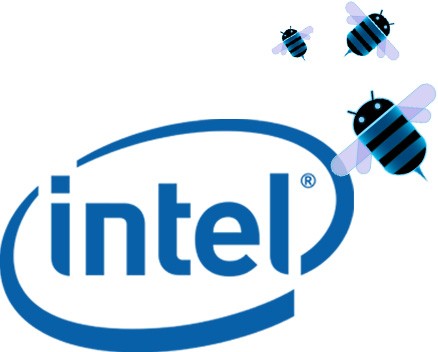Intel
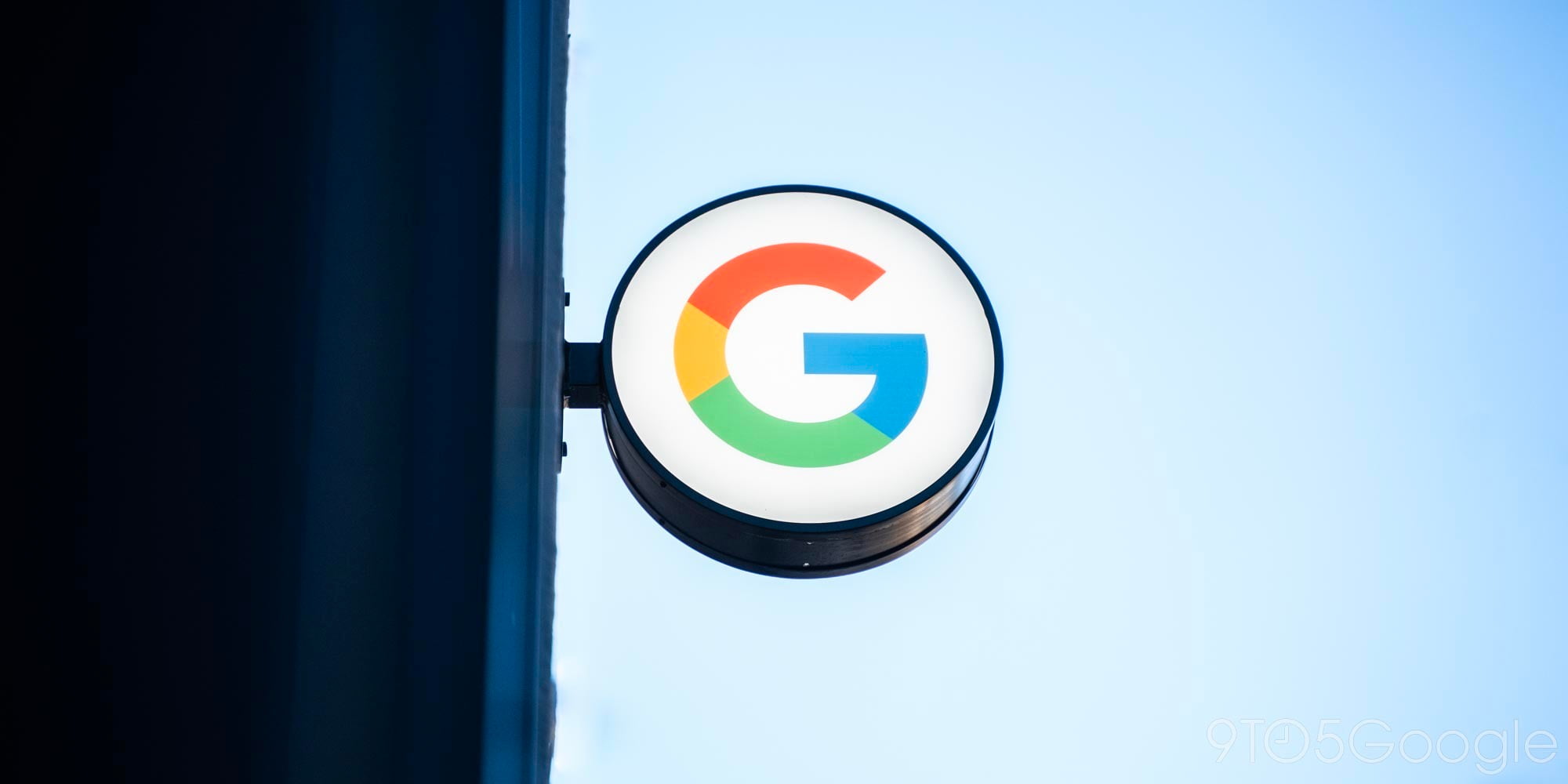

 Intel shared some news this week about its upcoming processors and more this week at an event held in China.
Intel shared some news this week about its upcoming processors and more this week at an event held in China.
As CNET reports, Intel’s senior vice president Kirk Skaugen revealed that the company’s follow up to its Chromebook-friendly Bay Trail processor is being called Braswell and will feature the usual jumps in battery efficiency and performance.
Intel also discussed optimizing Android for 64-bit:
Intel released Android KitKat 4.4 with a 64-bit kernel optimized for Intel Architecture devices. “With this release, the company ported, validated and tested the Android Open Source code on IA, taking on the work that developers typically would need to do on their own. This release will provide the ecosystem with 64-bit kernel support for development of next-generation devices,” Intel said. (The chipmaker noted that Android KitKat is a 32-bit OS.)

The Environmental Protection Agency has published its list of the top 30 tech and telecom companies in the U.S. that take advantage of the most renewable energy sources, placing Google near the top of the bunch at third place. Google’s green power consumption reached 737,364,727 kWh, according to the EPA’s report.
Only Intel and Microsoft managed to beat Google in total green power usage.
The study also notes that around 32% of Google’s total power usage comes from “green” sources, such as wind and solar, while the other 68% comes from non-green sources. Many companies easily beat the 32% statistic, but Google’s total power consumption, including non-green sources, is the highest of any other company on the list.

Just a few minutes after announcing the hybrid Transformer Book Duet, Asus has unveiled an entirely new line of Android devices dubbed ZenFone. Asus hasn’t had much luck in the Android phone market, due in large part to its odd choice to only release phones that dock in tablets. The company hopes that these ZenFone devices will bring it some commercial success, though.
The ZenFone devices will come in three sizes, 4-inches, 5-inches, and 6-inches. All models will be powered by a dual-core Intel Atom processor and be available in a wide-variety of colors. The devices will ship with Android 4.3 on board, but don’t get too excited, as Asus has decided to overlay its ZenUI on top of the operating system. Asus promises that ZenUI will be simply, beautiful, and easy to use. One feature Asus is heavily promoting is a What’s Next feature that keeps track of your daily schedules.

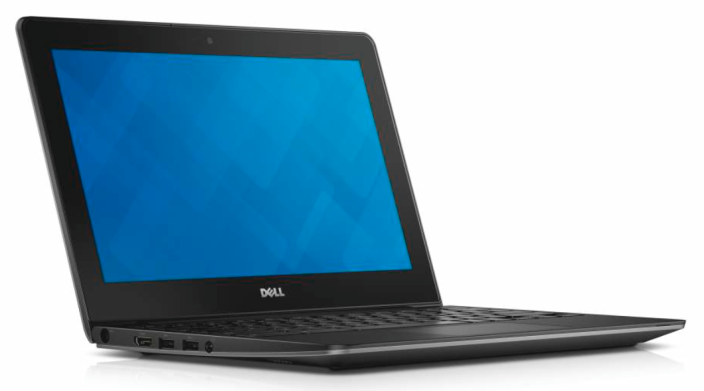
Microsoft’s renewed nervousness about Chromebooks was likely influenced by advance knowledge of Dell’s announcement that it would be joining Acer, HP and Samsung in manufacturing the ultraportable laptops in January.
The machine will have a Celeron 2955U processor, a choice of 2GB or 4GB RAM and 16GB of flash storage. The screen will be an 11-inch 1366×768 display with 720p front-facing webcam. You’ll get two USB 3 sockets plus HDMI in a case less than an inch thick and weighing under three pounds. Battery-life is said to be around 10 hours …
Expand
Expanding
Close

[protected-iframe id=”848de174e335ee9cb9bfb826d6674b89-22427743-13611283″ info=”http://c.brightcove.com/services/viewer/federated_f9?isVid=1&isUI=1″ width=”480″ height=”270″]
A Georgia Fire Chief is singing the praises of Google Glass. It isn’t hard to see why a heads up display would be a big benefit to Firefighters but a less Beta product would probably more optimal for bigger rollouts. (which are probably a year out at least).
Still, good for them for being open to trying it.
Expand
Expanding
Close

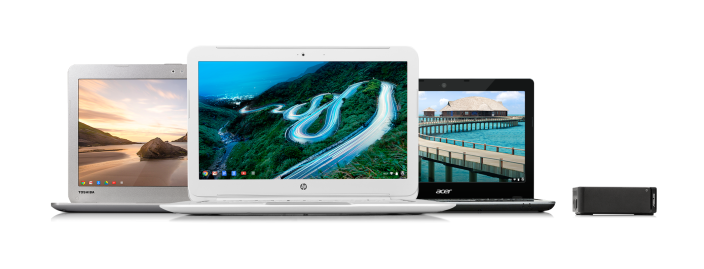
At Intel’s Developer Forum today, Google and Intel announced three new Chrome OS devices running on the latest Haswell processors. On the Google Chrome blog, Google says the new processors “sip less power to improve battery life by more than 2X over previous generations, while offering increased performance.”
Sadly, no prices or dates were announced for these devices, but these will probably be hitting the shelves shortly to join the touch-screen Pixel.

Intel is hoping to help schools make the transition to electronic learning with the announcement of two low-spec Android tablets intended to be cheap enough for bulk purchase, reports PhoneArena.
The smaller and presumably cheaper of the two comes with an Atom Z2420 chip running at 1.2GHz, 1GB of RAM, and a 7-inch, 1024 by 600 pixel display. There are also 8GB of storage, a built-in speaker and mike, basic front and rear cameras, and a sealed battery that should last through 8 hours of usage. That the tablet is resistant to some water and shock damage, bearing IP41 certification, is worth noting.
The larger of the two Intel Education Tablets is powered by a 1.6GHz Atom Z2460 processor backed by 1GB of RAM and its 10.1-inch display has a resolution of 1280 by 800 pixels. It offers twice the built-in storage, 16 gigs …
Expand
Expanding
Close

While we knew from earlier reports that Samsung was planning on unveiling a new high end tablet with an Intel processor, today Samsung has officially announced the device alongside a new 8-inch variant of its Galaxy Tab 3 line.
Adding to the 7-inch variant that it launched back in April, Samsung today announced the 10.1-inch Galaxy Tab 3 (which it later confirmed is indeed using a 1.6GHz dual-core processor from Intel), as well as an 8-inch variant of the device with a 1.5GHz dual-core CPU.
Inside the 10.1-inch model you’ll find 1280 x 800, 149PPI WXGA TFT display, a 3-megapixel main camera and 1.3-megapixel front facing cam, Bluetooth 4.0, microSD slot, and a 6,800 mAh battery. It weighs in at 510g for the WiFi only model, but will also be available with 3G and LTE capabilities when it launches running Android 4.2 later this month.
The 8-inch version comes with a 1280 x 800, 189PPI WXGA TFT display, 5-megapixel cam on the back, 1.3-megapixel on the front, Bluetooth 4.0, a 4,450 mAh battery, microSD expandable to 64GB, and the rest of the usual specs you find in Sammy’s tablets.
Samsung said both devices will be arriving in 16GB and 32GB variants sometime at the beginning of this month. Full specs for both devices below:
Expand
Expanding
Close

Apple CEO Tim Cook has been ordered by U.S. District Judge Lucy Koh in San Jose to give a deposition related to an ongoing private lawsuit that claims Apple, Google, and others entered “no-poach” agreements, as reported by Bloomberg. Cook isn’t the only executive named in yesterday’s order. Google Chairman Eric Schmidt will also be deposed on Feb. 20, as well as Intel Chief Executive Officer Paul Otellini later this month.
The judge said she was disappointed that senior executives at the companies involved hadn’t been deposed before yesterday’s hearing over whether she should certify the case as a group lawsuit. The class would include different categories of employees whose incomes, their lawyers argue, were artificially reduced because of the collusion. Koh didn’t rule on class certification.
At Koh’s request, the lawyers also agreed that Google Chairman Eric Schmidt will be deposed Feb. 20. Lawyers for the employees will depose Intel Chief Executive Officer Paul Otellini later this month, lawyers said.

[youtube=http://www.youtube.com/watch?feature=player_embedded&v=cxY9q_4mmIY#!]
In the video above, you are seeing the Tizen operating system. It is an open source project backed by Intel and Samsung, which runs Android apps thanks to a little help from OpenMobile. The video above comes from The Handheld Blog (via GigaOM). Tizen, which Samsung now plans to merge with its Bada platform, just launched version 1.0 this month and it recently received support from Sprint. In the demo video below, we see what might be our first look at the Tizen platform running on an Android device; although, the integration with OpenMobile to run Android apps is not an official feature of the OS yet.
GigaOM suggested Samsung could buy OpenMobile outright to integrate the technology and enable the roughly 400,000 existing Android apps to run on the up-and-coming platform. Go past the break for a the video of Tizen running on a Samsung Galaxy SII HD from the recent Tizen Developer Conference in San Francisco (via Engadget).

[youtube=http://www.youtube.com/watch?feature=player_embedded&v=x5KKQx04yD0&start=510]
Update: Scalado won’t confirm publicly what partners use its technology, but we’ve managed to confirm with a source close to the situation that RIM is using Scalado’s Rewind technology in BlackBerry 10.
If you happened to catch the highlights from RIM’s unveiling of BlackBerry 10 this morning, you probably noticed that slick new camera app with the ability to “rewind” time and capture the perfect expression of each person in the image. If you thought it looked familiar, it was probably because it looks almost identical to the Rewind technology from Swedish mobile imaging company Scalado.
[youtube=http://www.youtube.com/watch?v=J5EcUjwLr9k]
The company has been showing off its tech on Android and other platforms from partners such as Qualcomm and Intel for over a year. A video of Scalado’s Rewind tech is above, and BlackBerry 10’s is in the video above at the 8:30 mark or below at 1:15. Scalado appears to have already partnered with at least HTC for some of its other tech and works specifically with OEMs and developers to implement its apps.
It looks like RIM may have partnered with Scalado to implement its tech, which would mean BB 10’s coolest new feature is likely headed to Android and other platforms soon. We reached out to Scalado and will update if we hear back.


Late last week we told you that the U.S. Justice Department apparently had evidence that Google, along with Apple, Adobe, Intuit, Pixar, Intel, Walt Disney and Lucasfilms, entered “no-poach” agreements as part of an antitrust investigation from 2010. U.S. District Judge Lucy H Koh made a statement yesterday at the U.S. District Court in San Jose, Calif., confirming the companies must face a lawsuit. According to the report from Bloomberg, Koh said she would allow plaintiffs to re-file their complaint even if an initial request by the defendants to dismiss the claims is granted.
Judge Koh’s decision yesterday will result in Google and the other companies having to provide a detailed account of the agreements made with other companies. They must also allow lawyers to take depositions. One lawyer representing the plaintiffs, Joseph Saveri, said, “We get to see what really happened,” claiming the case could result in hundreds of millions of dollars in damages. Google provided statements to Bloomberg claiming they have “always actively and aggressively recruited top talent,” while the others have declined to comment.


A smartphone reference design by Intel.
Handset maker Motorola Mobility, which was acquired by Google, and is subject to approval from regulators in the United States and Europe, said at CES 2012 yesterday that it would release fewer phones in 2012. The company also announced a multi-year strategic mobile partnership with Intel to make Android smartphones powered by the chipmaker’s struggling Atom platform.
According to Motorola CEO Sanjay Jha’s roundtable meeting with reporters at CES yesterday, Motorola no longer sees value in dispersing its efforts by flooding the market with countless devices:
A lot of products that are roughly the same doesn’t drive the market to a new place. […] I made this decision independent of what the others will. We’re doing what we think is the right thing.
Motorola issued a warning last week on fourth-quarter results, and the company said numbers would come in below the $3.9 billion that most analysts expected. As for the Motorola-Intel partnership…

Intel has had little luck putting its chips into smartphones and tablets, as the devices continue to rely predominantly on silicon designs based around Britain’s ARM Holdings technology. Its easy to see why: ARM-licensed chips built by the likes of Nvidia, Qualcomm, Samsung and Texas Instruments are famous for their efficiency in terms of CPU performance versus power consumption.
Nevertheless, the world’s largest chipmaker is hoping to turn the tables with the Medfield platform: a 32-nanometer Atom processor for tablets and smartphones. Google and Intel announced a partnership at the Intel Developers Forum 2011 in San Francisco that promises to put Medfield chips in Android devices beginning January 2012.
Intel unveiled a reference design today for Android smartphones using the Medfield architecture. According to Technology Review, prototype hardware is speedier than today’s flagship smartphones without taxing the battery heavily. Medfield-driven Ice Cream Sandwich smartphones and tablets, performance-wise, should be able to play Blu-ray-rated high-definition video, stream to the tube over a wireless network, and take up to 10 8-megapixel images in burst mode. Do not mistaken the above image for an iPhone 4S, because it is just a reference prototype design meant as a guidance for OEMs looking to incorporate Intel’s chips into their products.


Image courtsy of Anandtech
TIMN reports that Google’s head of mobile, Andy Rubin, dropped a bombshell during his on-stage appearance at the Intel Developer Forum, by announcing that all future versions of Android will be optimized for Intel chips top to bottom. Intel also showed off a prototype Android tablet and phone running on the Medfield chip. Medfield is Intel’s fourth-generation mobile Internet device platform based on a 32-nanometer Atom processor.
The news prompted former Engadget editor Joshua Topolsky to observe on Twitter that Google is cozying up to Intel’s x86 platform at a time when Microsoft is adding support – for the first time in its history – for ARM’s mobile platform in Windows 8. Of course, we remember that Intel promised on numerous occasions that we’d see phones running on Intel chips in “early 2012,” even if everyone assumed the company was referring to Windows 8-powered devices. Google here wants to cover all bases with future versions of Android and it’s likely that the announcement will spark more competition between Intel and chip vendors that manufacture mobile chips based on ARM’s processor blueprints.


It’s no secret patent-related legal disputes have become the subject of most media coverage lately…Whether it’s Apple halting sales of Samsung’s tablets, HTC going after Apple, or Google snatching up Motorola to beef up their patent portfolio, it’s clear the company with the most patents will have an advantage over others in the legal proceedings that we’re bound to continue encountering down the road. This is why we’re intrigued by the graphic above (via GigaOM) from mobile analyst Chetan Sharma charting the number of issued patents (in the US and Europe) between 1993 and 2011.
While these estimates of mobile communications related patents don’t take the quality of patents into account (which is obviously a huge factor in determining their long-term value), you can see from the breakdown below that Nokia and Samsung top the list, with the other expected players including IBM, Microsoft, Sony, Motorola, and Intel following.
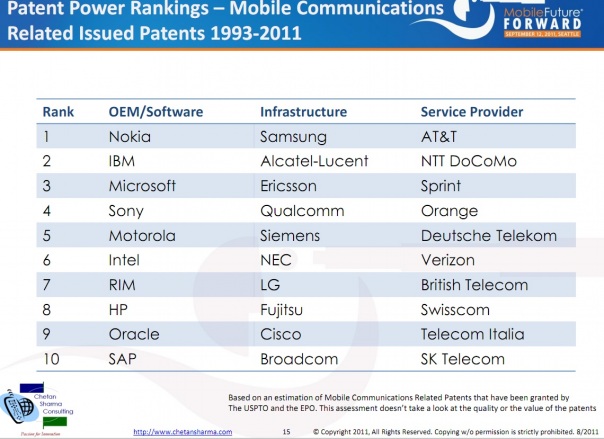
Noticeably far down the list is Apple, the one company who seems to have had more success than others fighting patent-related issues recently. Again, these numbers in no way represent the quality of patents and the ability for companies to protect their IPs in the courtroom… which is also a good indication that perhaps we should be looking more closely at the quality of patents rather than the sheer number.
Expand
Expanding
Close


So Intel has showcased six Honeycomb tablets at the Computex show, all of them engineered around the company’s latest 32-nanometer silicon code-named Medfield, the chip maker’s first system-on-a-chip engineered specifically for tablets and smartphones. Unsurprisingly, the demos fell on deaf ears with the veteran journalists who have seen it all.
Sean Moloney, Intel’s new president for China, flashed six Honeycomb 3.0 tablets and a smartphone during his opening keynote. He said reference designs for Medfield tablets and smartphones include both Android and ill-fated Meego software that Intel and Nokia co-developed for high-end mobile gear.
Intel has been trying for years to penetrate the potent mobile market where ARM-based processors designed by Nvidia, Texas Instruments, Apple and others woe device makers. Be that as it may, we don’t see Intel’s latest technology competing effectively with market incumbents – neither this nor next year. Why?
